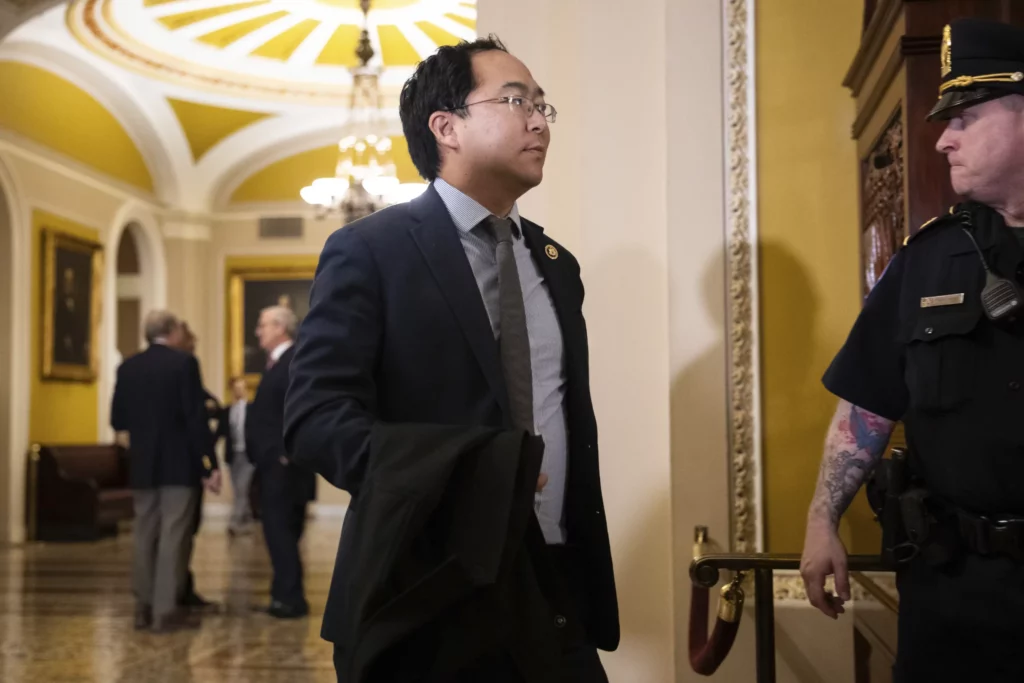
The 2024 election cycle has ended, with Republicans holding control of all three branches of government. The Washington Examiner interviewed over two dozen new members as they prepare to take office in January. Part 3 of Capitol’s new crop will focus on the 12 incoming freshmen who will help pass, or oppose, President-elect Donald Trump’s second-term agenda in the Senate.
The Senate is welcoming a dozen new members just as Republicans take control of the upper chamber in January.
Voters in Montana, West Virginia, Ohio, and Pennsylvania voted for Republican candidates to take over seats currently held by Democrats, giving the GOP a 53-seat majority. Several other states elected Democrats to fill the seats of retiring incumbents.
In total, there will be six freshman Democrats in the Senate next year and six freshman Republicans.
The newly elected senators range in age, with Sen.-elect Tim Sheehy (R-MT) the youngest at 39 and Gov. Jim Justice (R-WV) the oldest at 73 when he takes office. The median age of the Senate will hover around 65.
The new Senate Republicans
Senate Republicans will have six new members, four of whom flipped blue seats. Those who won Democratic seats to help the GOP retake the majority included Sheehy of Montana, Bernie Moreno of Ohio, Dave McCormick of Pennsylvania, and Justice of West Virginia.
Reps. John Curtis (R-UT) and Jim Banks (R-IN) kept Republican seats in their respective states.
“The nation surveyed its problems and decided that Republicans were equipped to put the ship of state back on the right track,” outgoing GOP Leader Mitch McConnell (R-KY) said in the wake of the elections. “Here in the Senate, I hope [Democrats] work with the new Senate Republican majority as we begin to clean up the messes left over from the last four years.”
Several of the incoming GOP senators are wealthy businessmen who are likely to put spotlights on economic and fiscal policy issues with their professional experience.

In Montana, Sheehy ousted three-term Sen. Jon Tester (D-MT) in one of the nation’s most competitive Senate battles. The political outsider is a former Navy SEAL and founder of aerial firefighting and surveillance company Bridger Aerospace.
Sheehy attributed his triumph over the Democratic incumbent to President-elect Donald Trump’s coattails and a “common sense” platform that he said resonated with average voters.
“A secure border, safe streets, cheap gas, cops are good, criminals are bad, boys are boys, girls are girls, and people want common sense back,” Sheehy told the Washington Examiner. “I think between our retail focus, straight talk, and common sense message. Of course, we had some great help, too. President Trump came out. That meant a lot.”
Senate Republicans have yet to dish out new committee assignments. Given his experience, Sheehy said he hopes to have positions that allow him to have influence over the business sector and national defense.
Moreno unseated three-term Sen. Sherrod Brown (D-OH) in another battleground state. Although a freshman himself, Moreno will also wear the title of senior senator from Ohio when Vice President-elect J.D. Vance has to vacate his seat and Gov. Mike DeWine (R-OH) makes an appointment.
“It’s a great honor to be here,” Moreno said in an interview. “It’s a hefty weight of responsibility to make sure to represent the people of Ohio properly, and so I take that job very seriously.”
Naturally, the one-time luxury car dealer and blockchain entrepreneur cited automotive and crypto issues as important policy arenas he hopes to focus on.
McCormick came out on top in battleground Pennsylvania over another third-term Democratic senator, Bob Casey. The win was not crucial to recapturing the upper chamber, but it did deepen the Republican bench. The race was called for McCormick, a former executive of hedge fund Bridgewater Associates and a U.S. Army combat veteran, days after the election. However, Casey refused to concede until an automatic recount was conducted.
“The one message we heard over and over again was we need change. The country is headed in the wrong direction,” McCormick said in his victory speech, citing the economy, inflation, crime, fentanyl drug trafficking, and domestic energy production. “There’s a mandate for change.”
The GOP’s fourth seat flip came from Justice, the Democrat-turned-Republican finishing his second term as West Virginia governor. His win was a slam dunk for Republicans. He’ll follow in the footsteps of retiring Sen. Joe Manchin (I-WV), the Democrat-turned-independent who still caucuses with Democrats.
Still, the seat was a major one for Republicans. With Manchin retiring, no other Democrat could mount the same kind of challenge in red West Virginia. Justice, a coal mining baron, brings with him to the Senate his beloved and famed English bulldog named Babydog.
“What I don’t understand, is I think they called this at 7:31 p.m. Polls closed at 7:30,” Justice said as an opening line of his victory speech. “What took them so long?”

In the Beehive State, Curtis was elected to fill the shoes of retiring Sen. Mitt Romney (R-UT). Curtis has served in the House since 2017 and was previously mayor of Provo, Utah.
He’s a vocal advocate for the GOP to more seriously address climate change. And while a conservative, Curtis has a history of disagreeing with Trump.
Still, he doesn’t want to be known as the Romney replacement or the conservative “climate guy.” Instead, Curtis is looking to chart a fresh path of his own that’s likely to land him somewhere between the dwindling centrist faction crucial to striking deals with Democrats and the hard-line conservative wing that’s seen its ranks grow in recent elections.
“You elected me to legislate, to advocate, and represent you. My agenda will be your agenda. My voice will lift your voice. My vote will reflect your values,” Curtis told supporters after his election. “And tougher, we’ll make Washington more like Utah and America more like our children and our grandchildren need it to be.”
In what was another safe race for Republicans, Banks was selected for the open seat of outgoing Sen. Mike Braun (R-ID). Braun was elected Indiana governor and will assume the office in January.
Banks, in contrast to Curtis, is a loyal and vocal defender of Trump. He’s represented Indiana’s 3rd Congressional District since 2017, when Trump first came into office, and voted against certifying President Joe Biden’s 2020 election win.
“I will be part of his backup crew to put America first and put this country back on track,” Banks vowed to voters on election night.
The new Senate Democrats
Senate Democrats will have six new members after incumbent senators either retired, resigned, or died in office. Democrats failed to flip any seats this cycle, and three incumbents lost their reelection bids.
Senate Majority Leader Chuck Schumer (D-NY) touted the new freshman as “the most diverse slate of candidates ever.” He noted that incoming Sens. Lisa Blunt Rochester (D-DE) and Angela Alsobrooks (D-MD) will be the first two black women to serve together in the Senate, Sen.-elect Andy Kim (D-NJ) will be the first Korean American elected to the chamber, and Sen.-elect Ruben Gallego (D-AZ) “expands the number of Hispanic Senators.”
This new class of Dem Senators is the most diverse slate of candidates ever
Sens. Blunt Rochester and Alsobrooks mark the 1st time 2 Black women have served together in the Senate
Sen. Kim is the 1st Korean American to serve
Sen. Gallego expands the number of Hispanic Senators pic.twitter.com/PgR7y6qQAG
— Chuck Schumer (@SenSchumer) November 13, 2024
Sen. Gary Peters (D-MI), who chaired the Democratic Senatorial Campaign Committee this cycle, praised the new members, emphasizing he’s had the chance to get to know all of them.
“When you think about our caucus and the Senate in general, you have a cross-section of life experiences and perspectives,” he said, speaking to reporters. “I think all our new members are really going to flourish here.”
Gallego won his race in a battleground state that Trump flipped and will become the first Latino to represent Arizona in the upper chamber. The Democratic congressman will replace outgoing Sen. Kyrsten Sinema (I-AZ), the Democrat-turned-independent who ultimately decided she would retire instead of running in a three-way race.
In the past, Gallego campaigned as a “real progressive,” and he belonged, for eight years, to the Congressional Progressive Caucus. However, he embraced a more centrist identity during his Senate race and worked hard to appeal to Latino men. Gallego, a first-generation American, ran 9 points ahead of Vice President Kamala Harris in the Grand Canyon State with Latino men, according to exit polling.
“We did all the extracurricular kind of different events really to attract Latino male voters and to keep them in the Democratic column,” Gallego said, speaking to reporters at the DSCC’s Washington headquarters earlier this month. “We had rodeos, we had lowrider shows, we had different types of cultural messaging out there that really caught fire.”
Gallego said that his message really boiled down to protecting and providing for Arizona’s families.
“It was all wrapping around this economic message,” he said. “We talked about tourism, we talked about business, we talked about real border solutions.”

After high-profile clashes with Trump during his first term, Sen.-elect Adam Schiff (D-CA) has signaled he will focus on being Trump’s chief antagonist in the upper chamber.
Schiff won California’s Senate race and will replace the late Sen. Dianne Feinstein (D-CA). Sen. Laphonza Butler (D-CA) is currently serving in the seat after Gov. Gavin Newsom appointed her last year following Feinstein’s death. Butler opted not to seek election.
Schiff has spent the past two decades in the House and rose to national prominence when he led the first impeachment trial of Trump, urging senators to remove him from office.
Trump has sparred with Schiff in the past, previously calling him “shifty,” a “liar,” “traitor,” and one of the country’s “enemies from within.”
The California Democrat recently said he wants to focus on economic issues like bringing down the cost of living, food, housing and child care, according to an interview with the Los Angeles Times.
Blunt Rochester will fill the shoes of retiring Sen. Tom Carper (D-DE), who is leaving the upper chamber after four terms. Carper was her mentor and hired her as a congressional intern when she was a graduate student.
The 62-year-old will become the first black woman to represent Delaware in the Senate. Blunt Rochester is in her fourth term in the House and already made history as the first woman and the first black person to represent Delaware in Congress.
During her election night speech, she acknowledged the black women who came before her in the Senate.
“As I prepare to step foot on that trail blazed by the three strong black women senators who came before us — Ambassador Carol Moseley Braun, Vice President Kamala Harris, and Senator Laphonza Butler — I have a message to the young people who are standing up, speaking up, and giving your all for our country and the world,” she said. “I see you, I’m grateful for you and you’ve got next.”
In her speech, she vowed to represent Delaware’s voters, “whether you voted for me or not,” and highlighted the economy, “common sense” gun reform, and climate change as priorities for her Senate term.

Alsobrooks (D-MD) will be the second black woman to serve in the Senate for the 119th Congress after defeating popular former Gov. Larry Hogan. The chief executive of Prince George’s County and a former prosecutor, Alsobrooks will replace retiring Sen. Ben Cardin (D-MD), who served three terms.
Alsobrooks’s campaign centered on issues like protecting Social Security, preserving abortion access, and enacting tighter gun laws. Alsobrooks launched her career in government as an assistant county prosecutor. She was eventually elected as the county’s first female state attorney general in 2010, before becoming its first female county executive in 2018.
“To each and every Marylander, I say this: I will make your care my concern; your hope my focus; and your dreams my work in the days and years to come,” she said during her election night speech.
The retirement of longtime Sen. Debbie Stabenow (D-MI) set off one of the most competitive Senate races in 2024 but will stay in Democratic hands after Rep. Elissa Slotkin (D-MI) narrowly won her race.
The Michigan Democrat served three tours in Iraq as a CIA analyst before representing Michigan in the House for three terms. The incoming senator attributed her win to focusing on the economy, or “kitchen table” issues.
“The kitchen table issues and focusing on and prioritizing the issues that keep people up at night, which are almost always their pocketbooks and their kids,” Slotkin told reporters last week. “It’s not rocket science, but talking about those issues plainly, not from the faculty lounge, but from the assembly line, I think is a very important message.”
Slotkin is one of four Democratic Senate candidates who won their battleground states. She said Democrats need to ditch “identity politics” if they want to win over voters in future elections.
“I personally think that identity politics needs to go the way of the dodo, people need to be looked at as independent Americans, whatever group they’re from, whatever party they may be from – and you have to approach them with an open, generous heart,” she said.

In New Jersey, where Asian Americans are the fastest-growing demographic, Kim is taking over the seat vacated by disgraced former Sen. Bob Menendez (D-NJ), who resigned after he was convicted on charges of taking bribes in exchange for official government acts.
Kim is the Senate’s fourth-youngest member, and the first senator from south Jersey since 1955. Kim is also the first Asian American senator from New Jersey. The 42-year-old is a three-term congressman who represents a largely rural and suburban district in southern and central New Jersey.
“The much smaller size of the number of senators is something very noticeable,” Kim said, speaking to the Washington Examiner. “My incoming class, I think there are 12 of us; they’re telling us that’s big — but that’s very small compared with what we deal with in the House.”
Kim has already had a prominent foreign policy career. He served as the National Security Council’s director for Iraq during President Barack Obama’s administration. In Afghanistan, Kim worked as a strategic adviser to Gen. David Petraeus and Gen. John Allen. The New Jersey Democrat said he hopes he’ll be tapped to serve on some kind of national security committee.
CLICK HERE TO READ MORE FROM THE WASHINGTON EXAMINER
“I hope to be on a national security committee, you know in terms of which one, I need to get a sense of how many people are returning or not, but that’s something certainly that I want,” Kim said.
“I also want to make sure that I can be at a place where I can try to tackle some of the issues at home, including the high cost, so whether that’s on the healthcare side or on the business side, I’m going to figure out where I can be the most helpful,” he added. “I still need to have a conversation with senior Sen. Booker about what kind of coverage we will need for New Jersey.”



